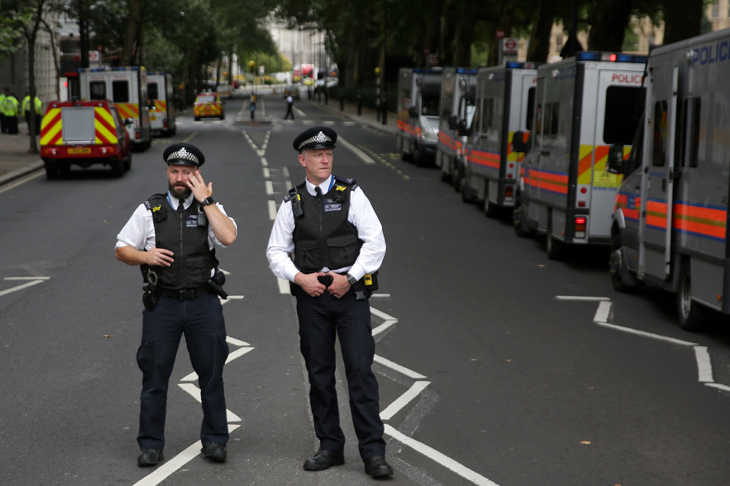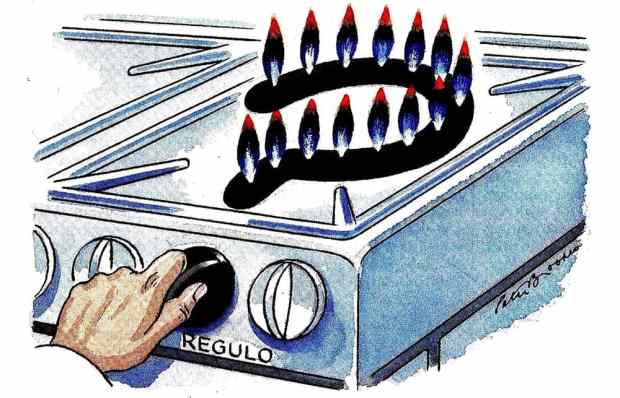By now, the routine is familiar: a lone wolf strikes, roads are sealed off, buildings locked down and a biographical picture begins to emerge. Often, the perpetrator turns out to be born and bred in Britain. His astonished friends and neighbours say they saw no signs that he had succumbed to fanaticism. It later emerges that radicalisation happened incredibly quickly — perhaps inspired by online videos — and the terror plan was so low-tech that interception would have been impossible. How, it might be asked, can any country protect itself against such threats?
But Britain has protected itself, both in thwarting such attacks and in blunting their impact. The latest attacker found the House of Commons protected by barriers. After driving around Westminster for 90 minutes, he drove into one of these barriers, killing no one. Within seconds, he was in handcuffs. It was, of course, a reminder of a vulnerability, the type of attack that could come from anyone with a car and murderous intent. But it was also a reminder of the professionalism of the police and security services, and the efficacy of the steps taken.
Since last year’s attack in Westminster, 13 Islamist terror plots have been thwarted in the UK. The relative quiet we have seen recently is not because of a lack of jihadists. Instead, it shows the effectiveness of the security services: how a democracy can respond, successfully, to a terror threat without loss of civil liberties or making citizens feel under siege. Jihadists are now resorting to smaller plots, knowing that larger ones will probably be thwarted.
Al Qaeda used to publish a digital magazine called Inspire. British spies were eventually able to hack into it, at one point changing bombmaking instructions into a recipe for cupcakes. The ability of spies to intercept terror cells led the Islamic State to realise at an early stage that it would be unable to hatch 9/11-style mass-casualty attacks because whenever a network of potential jihadists is created in the West, it now stands a high chance of being intercepted. Last year, Khalid Masood used a car and a knife to take five lives in Westminster and injure 50. Tom Hurd, the counter-terrorism chief, has long argued that this — the lone wolf attack — is the main threat because larger attacks, with hundreds of potential victims, are now normally prevented.
It’s not that terrorism is failing. It’s that it has failed, demonstrably, in Britain and abroad: it can claim lives but it never succeeds in achieving its stated aims. The IRA’s campaign for a united Ireland was an abject failure, after almost a quarter-century of bomb attacks and 3,600 killed in the Troubles. Al Qaeda’s stated aim was the withdrawal of American influence from the Middle East, specifically Saudi Arabia. In the end, Osama bin Laden ended up advising his lieutenants not to target civilians because it was counterproductive.
Chechnya was on course for independence from Russia before its separatists were blamed for the bombing of two Moscow flats in 1999, which killed hundreds. From that point on, the Chechen agenda was viewed with the sort of contempt that the Spanish hold for Basque separatists after the atrocities of ETA. One study of 40 years of terrorism, starting in 1968, found that 96 per cent of such movements failed to achieve their objectives in any way at all. For attacks using suicide bombs, the failure rate was 100 per cent. Terrorism might be an expression of rage, but it always serves to harden opposition to the cause.
The Islamic State has now gone the way of al Qaeda. It has been forced out of its various strongholds and its force of 100,000 fighters has been reduced to a rump. Three years ago, security officials were braced for a spate of terror attacks as an estimated 850 of Islamic State’s British recruits began to return home. But our security services have risen to the challenge.
The nature of their work means that we rarely hear about the success stories. Ministers, quite understandably, will still always talk up the likelihood of an attack. Vigilance is essential because, as the IRA once put it, terrorists just need be lucky once. But after stepping down as head of MI6, Sir Richard Dearlove said that the jihadi menace is ‘obviously serious, but containable and ultimately manageable’.
There has long been talk of closing Parliament Square to traffic, to improve security, but it has been resisted by politicians because this would be seen as giving in to jihadists. Instead, security has been stepped up and security barriers erected — which, as we saw this week, were effective. The greatest resource is the courage of the police who risk their lives guarding the public; one gave his life last year.
Such bravery means that our democratic architecture has been able to survive — and the terrorist aim of creating a climate of fear has failed. It will, of course, never be possible to prevent attempted attacks. But recent history shows that it is possible to stop terror succeeding. Democracies tend not to give in to terror.
Got something to add? Join the discussion and comment below.
Get 10 issues for just $10
Subscribe to The Spectator Australia today for the next 10 magazine issues, plus full online access, for just $10.
You might disagree with half of it, but you’ll enjoy reading all of it. Try your first month for free, then just $2 a week for the remainder of your first year.














Comments
Don't miss out
Join the conversation with other Spectator Australia readers. Subscribe to leave a comment.
SUBSCRIBEAlready a subscriber? Log in